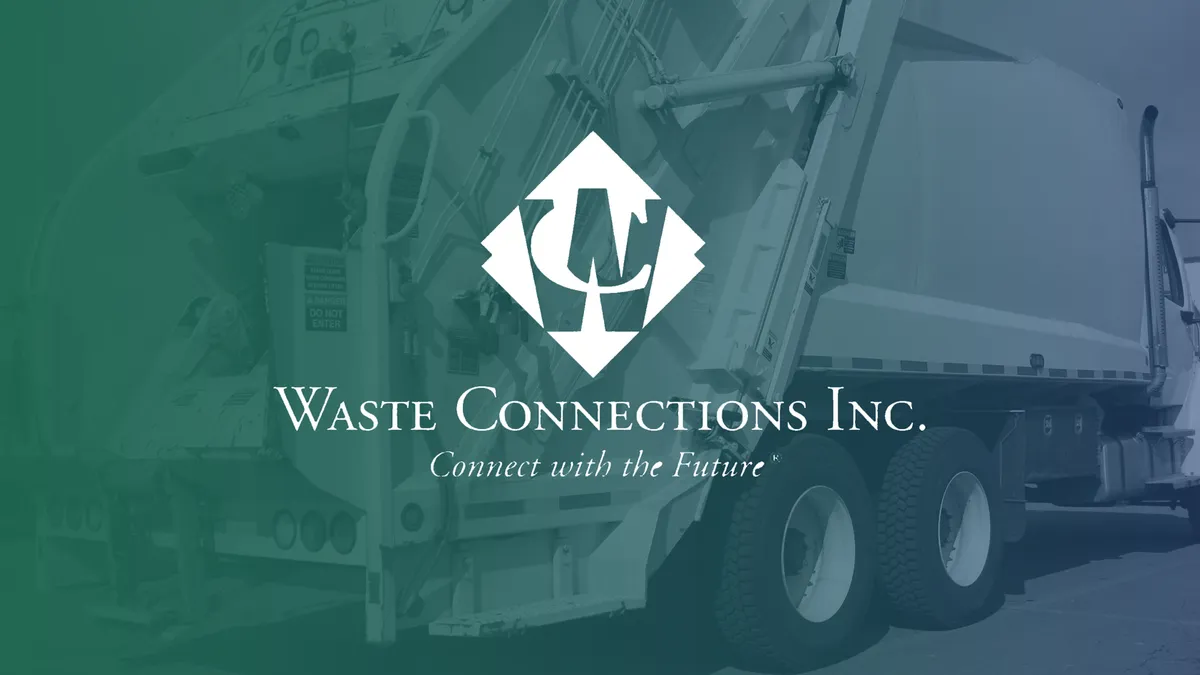2017 Earnings
| Revenue | $4.63B |
| YoY Change | 27.4%▲ |
Q4 Earnings
| Revenue | $1.16B |
| YoY Change | 10.4%▲ |
| YoY Recycling Revenue | $3M ▼ |
Dive Brief:
- Waste Connections has already locked in acquisitions with a combined added revenue of $110 million this year and expects to finalize deals worth $50-100 million in the coming months. This includes Bay Disposal & Recycling — a company with 70,000 customers in North Carolina and Virginia — and two tuck-ins in New York and Texas. During its Q4 earnings call, CEO Ron Mittelstaedt also hinted at a recently signed deal for a company with $40 million in revenue and its own landfill in "one of the fastest growing parts of the U.S."
- Though it's less exposed than some competitors, Waste Connections is projecting a $45 million recycling headwind this year. "...The reality is that I think the recycling model overall is broken. It’s broken because it costs about three times as much to collect and process a ton of recyclables as it does to put it on a landfill," said Mittelstaedt. He said fixing this will require changing customer expectations and pricing structures in order to cover more long-term capital expenditures.
- While Waste Connections' Canadian domicile means less of a tax cut bump, the company is still making out well with a $210 million benefit so far. When asked whether this would lead to bonuses, Mittelstaedt outlined plans to raise the company's minimum wage to $12, increase 401(k) matching and invest an additional $5-10 million per year in facility upgrades as long as the tax cut remains in effect.
Dive Insight:
Like its other two large competitors, Waste Connections saw big gains in 2017 and is similarly optimistic about 2018. Recycling may be a minor drag now, but the company expects other revenue sources will "more than offset" it. Annual revenue is currently projected at $4.825 billion, with 3.5% estimated pricing growth and expectations for ongoing volume increases.
Mittelstaedt had been one of the more frequent commentators on possible tax cut effects throughout 2017 and directly tied it to expected economic growth in the years ahead due to money coming back from overseas.
"We believe you’re going to see additional manufacturing and construction as that money gets put to work. You are seeing companies of all sizes and now that they will take cash flow or cash tax savings. Some is being distributed to employees. Some is being put to M&A. Some is being put into facility re-development and new facility development. All of that brings jobs, all of that brings waste. And so us and the industry should be a benefactor of that," he said.
Just as others in the industry have, Mittelstaedt repeatedly mentioned that this could all be temporary depending on the outcome of upcoming elections. Until then, he expects "there will be quite a bit of accelerated M&A activity."
The topic of employee retention also received more discussion than usual, with new details on how numbers have shifted since acquiring Progressive Waste Solutions in mid-2016.
Prior to that deal, Waste Connection's turnover rate was around 18%. That spiked after the deal, where the vast majority of turnover was voluntary due to what has previously been described as an "unhealthy" company culture with a mixed safety record. By the end of 2017, the overall turnover rate was stable at 23% but Mittelstaedt said he'd prefer it be lower with a more even split of voluntary versus involuntary departures. The South was said to present some of the highest risk and turnover rates, though also biggest opportunity in terms of growth and labor markets.
Whether the planned pay increase to a $12 minimum will aid retention remains to be seen. Mittelstaedt said it would affect 3-4% of employees, which wouldn't include drivers because anyone with a CDL would already be making more than that. Following Waste Management's $2,000 bonuses and Republic Services' plans for vehicle and facility upgrades, this presents yet another approach for addressing labor challenges with the new tax cut windfall.














